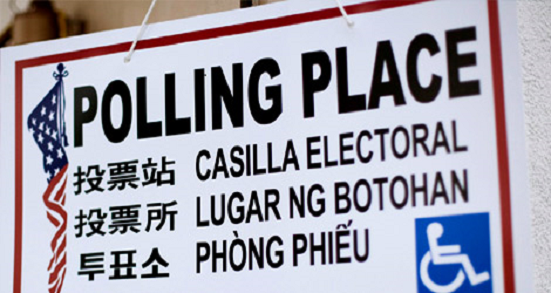Washington, DC - October 25, 2016 - In anticipation of the upcoming general elections, the Justice Department today provided information about its efforts, through the Civil Rights Division and Criminal Division, to ensure that all qualified voters have the opportunity to cast their ballots and have their votes counted free of discrimination, intimidation or fraud in the election process.
Civil Rights Division:
The Civil Rights Division is responsible for ensuring compliance with the civil provisions of federal statutes that protect the right to vote and the criminal provisions of federal statutes that prohibit discriminatory interference with that right.
The Civil Rights Division’s Voting Section enforces the civil provisions of a wide range of federal statutes that protect the right to vote including: the Voting Rights Act, the National Voter Registration Act, the Uniformed and Overseas Citizens Absentee Voting Act, the Help America Vote Act and the Civil Rights Acts. Among other things, collectively, these laws:
- prohibit election practices that have either a discriminatory purpose, based on race or membership in a minority language group, or a discriminatory result, with members of racial or language minority groups having less opportunity than other citizens to participate in the political process;
- prohibit voter intimidation;
- provide that individuals who need assistance in voting because of disability or illiteracy can obtain assistance from a person of their choice;
- provide for accessible election machines for voters with disabilities;
- require provisional ballots for voters who assert they are eligible but whose names do not appear on poll books;
- provide for absentee ballots for service members, their family members and U.S. citizens living abroad;
- require states to ensure that citizens can register through drivers’ license offices, public assistance and disability services offices, other state agencies and through the mail; and
- include requirements regarding maintaining voter registration lists.
The Civil Rights Division’s Criminal Section enforces federal criminal statutes that prohibit voter intimidation and voter suppression based on race, color, national origin or religion.
On Election Day, Nov. 8, 2016, the Civil Rights Division will implement a comprehensive program to help protect the right to vote, including:
- The Civil Rights Division will conduct monitoring in the field at polling places around the country (locations for monitoring will be announced closer to Election Day).
- Civil Rights Division attorneys in both the Voting and Criminal Sections in Washington, D.C., will be ready to receive election-related complaints of potential violations relating to any of the statutes the Civil Rights Division enforces. Attorneys in the division will take appropriate action and will consult and coordinate with local U.S. Attorneys’ Offices and with other entities within the Justice Department concerning these complaints before, during and after Election Day.
- Civil Rights Division staff will be available by phone to receive complaints related to voting rights (1-800-253-3931 toll free or 202-307-2767) or by TTY (202-305-0082). In addition, individuals may also report complaints, problems or concerns related to voting by fax 202-307-3961, by email and by complaint forms that may be submitted through a link on the department’s website
- Complaints related to violence, threats of violence or intimidation at a polling place should always be reported immediately to local authorities by calling 911. They should also be reported to the department after local authorities are contacted.
Criminal Division and the Department’s 94 U.S. Attorneys’ Offices:
The Department’s Criminal Division oversees the enforcement of federal laws that criminalize certain forms of election fraud and vindicate the integrity of the federal election process.
The Criminal Division’s Public Integrity Section and the department’s 94 U.S. Attorneys’ Offices are responsible for enforcing the federal criminal laws that prohibit various forms of election fraud, such as vote buying, multiple voting, submission of fraudulent ballots or registrations, alteration of votes and malfeasance by election officials. The Criminal Division is also responsible for enforcing federal criminal law prohibiting voter intimidation for reasons other than race, color, national origin or religion (as noted above, voter intimidation that has a basis in race, color, national origin or religion is addressed by the Civil Rights Division).
The U.S. Attorney’s Offices around the country designate Assistant U.S. Attorneys who serve as district election officers (DEOs) in the respective districts. DEOs are responsible for overseeing potential election-crime matters in their districts and coordinating with the department’s election-crime experts in Washington, D.C.
On Nov. 8, 2016, the U.S. Attorneys’ Offices will work with specially trained FBI personnel in each district to ensure that complaints from the public involving possible voter fraud are handled appropriately. Specifically:
- In consultation with federal prosecutors in the Public Integrity Section in Washington, D.C., the DEOs in U.S. Attorneys’ Offices, FBI officials at Headquarters in Washington, D.C., and FBI special agents serving as Election Crime Coordinators in the FBI’s 56 field offices will be on duty while polls are open to receive complaints from the public.
- Election-crime complaints should be directed to the local U.S. Attorney’s Offices or the local FBI office. A list of U.S. Attorneys’ Offices and their telephone numbers can be found at here. A list of FBI offices and accompanying telephone numbers can be found here.
- Public Integrity Section prosecutors are available to consult and coordinate with the U.S. Attorneys’ Offices and the FBI regarding the handling of election-crime allegations.
- Again, complaints related to violence, threats of violence or intimidation at a polling place should be reported first to local police authorities by calling 911.
Both protecting the right to vote and combating election fraud are essential to maintaining the confidence of all Americans in our democratic system of government. The department encourages anyone who has information suggesting voting discrimination or ballot fraud to contact the appropriate authorities.










